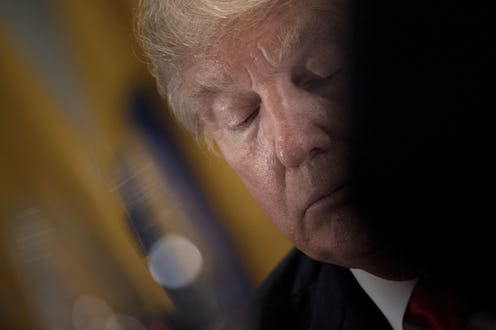News
This One Tweet Eviscerates Trump For Saying NFL Players Can't Protest Because They're Rich

On Friday night at a rally in Alabama, President Donald Trump returned to the well of fire-breathing, wildly inflammatory culture war rhetoric on race and protest. He asked a crowd of enthusiastic supporters if they'd like to see NFL owners kick players who protest during the national anthem off their teams, a clear reference to exiled free agent NFL quarterback Colin Kaepernick. He followed it up with some incendiary tweets the next morning, which sparked a lot of reaction ― one particular tweet about Trump's NFL comments, for example, laid bare the commander-in-chief's attacks on racial justice protests.
On Saturday afternoon, Trump reiterated his NFL comments from the previous night, tweeting:
If a player wants the privilege of making millions of dollars in the NFL, or other leagues, he or she should not be allowed to disrespect.... ...our Great American Flag (or Country) and should stand for the National Anthem. If not, YOU'RE FIRED. Find something else to do!
The tweets had the effect Trump likely expected ― and perhaps desired? ― eliciting a storm of criticism and pushback. For example, this tweet from writer/director and former pro football wide receiver Matthew Cherry, who made a point that so often gets overlooked in conversations about wealthy black athletes. "When has having money ever made a black person immune to injustices in America?" Cherry asked.
Trump, for his part, had taken a number of shots at professional sports figures on Saturday morning. He started by tweeting that he'd rescinded the NBA champion Golden State Warriors' invite to the White House because its superstar point guard, Stephen Curry, has been public about not wanting to go. (It's worth noting that most of the team's marquee players had already made it clear they wouldn't visit a Trump White House.)
As Cherry states in his tweet, successful black athletes may achieve a state of class privilege, but that's not the same thing as racial privilege. For generations, countless black athletes have excelled on the most high-profile dramatic stages in American sports. And yet, when some have decided to use their platforms for a bigger purpose, the backlash has often been swift, unforgiving, and itself deeply racist.
Kaepernick, after all, is not the first pro athlete to suffer consequences for taking a stand. Former NBA guard Mahmoud Abdul-Rauf, for example, was suspended by the league for refusing to stand for the national anthem back in 1996, and his career was basically never the same. While he was a multimillionaire, and a hugely popular, high-scoring player for the Denver Nuggets, none of that shielded him from the ferocious backlash that erupted over his act of silent, unassuming protest.
Basketball superstar and icon LeBron James is another vivid example, especially since he tweeted a blunt and punchy response to Trump's comments about Curry on Saturday morning. Calling the president a "bum" James tweeted that it was an honor for a championship team to visit the White House "until you showed up."
Anyone who doubts the experience that James ― who's reportedly racked up more than $400 million throughout his playing career ― has as a black man in America need only look through the Twitter mentions he's gotten since sending the above tweet. (Be forewarned, however, they're inundated with absolutely vile racial epithets.) Also, James' Los Angeles residence was reportedly vandalized with racist graffiti last year.
In short, while class privilege and racial privilege aren't unrelated, they're also wholly distinct phenomena. And as the president and his throngs of supporters have shown over the past 24 hours, there's a harrowing appetite among many conservative white sports fans for demagogic attacks against any black athlete who chooses to exercise their voice.